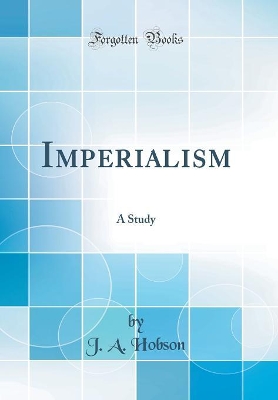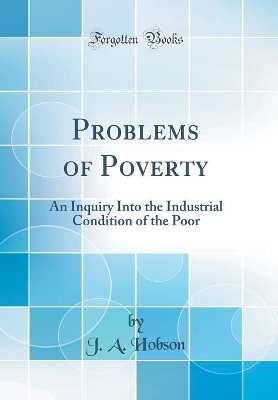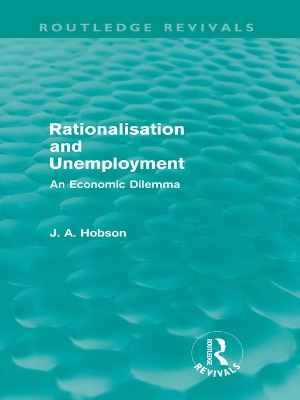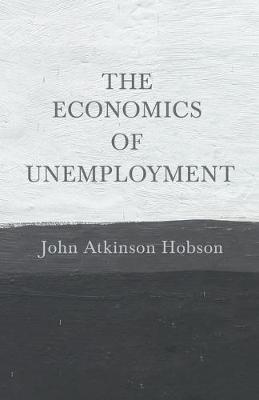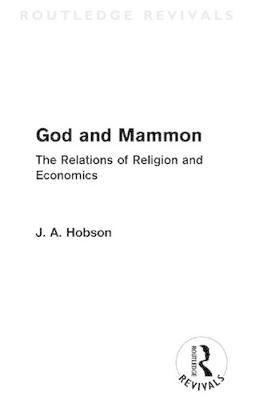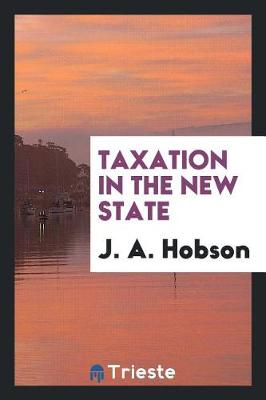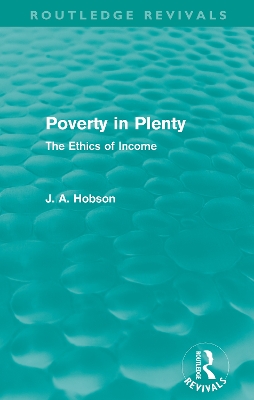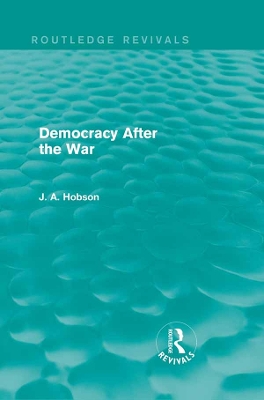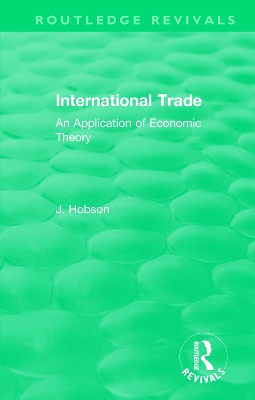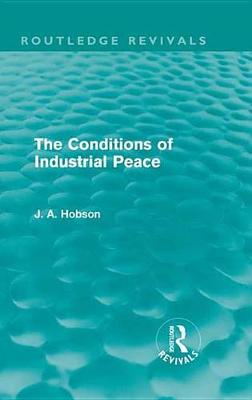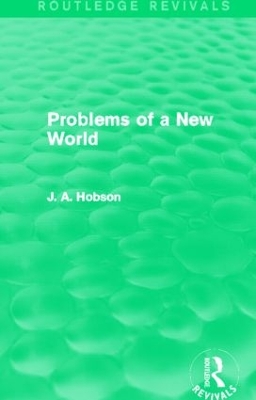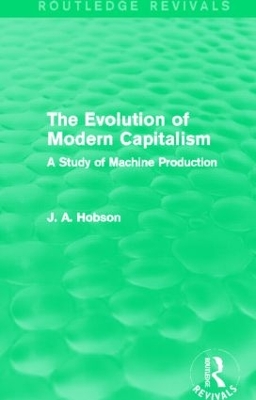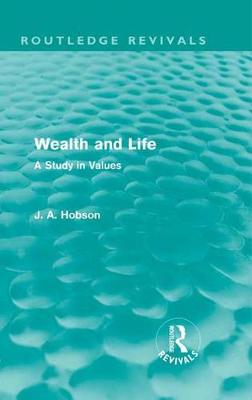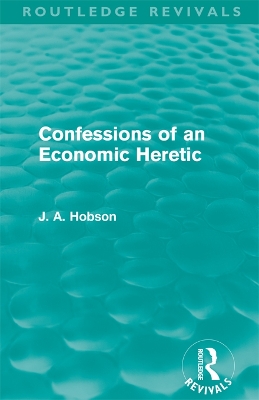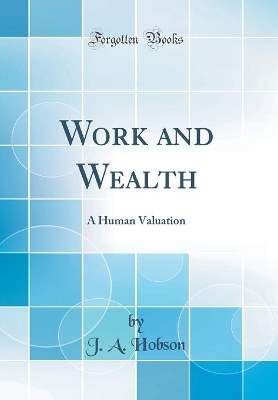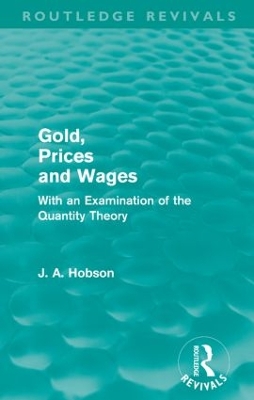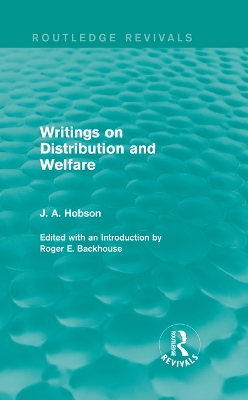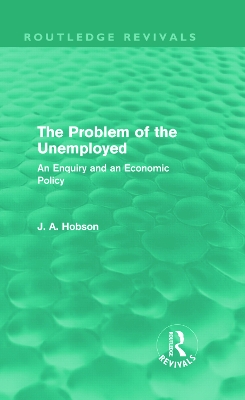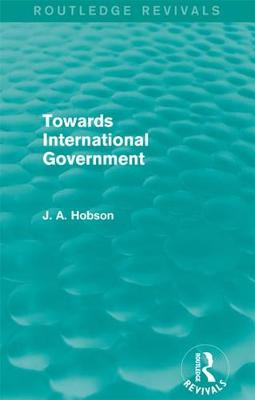Routledge Revivals
23 total works
Originally published in 1902, this study expands on the ideas of imperialism which were a key focus of many countries in the early twentieth century, particularly in Great Britain. Hobson starts by outlining the economic origins of imperialism with an analysis on methodology and results, before delving into the theory and practice of Imperialism and its political significance at the turn of the century. This edition was first published in 1938 and was completely revised to reflect the changes that occurred in world history from first publication. This title will be of interest to students of Politics or History.
First published in 1891, this seminal work examines the primary causes of poverty during the industrial age. Through considering how poverty is measured, the growth of urbanisation and the supply of low-skilled labour in the workforce, Hobson arrives at possible solutions to the problem of poverty and explores the ethical issues surrounding it.
First published in 1930, John Hobson’s study deals with the economic dilemmas generated in the early twentieth century by the advent of mass production. Namely the over-production and surfeit of goods and the resultant failure of the expansion of markets leading to record levels of mass unemployment.
Seeking a solution to this dilemma, Hobson analyses all aspects of the problem: income, uses of the surplus, underconsumption, markets and distribution, and internationalism. The study also explores theories concerning economies of rationalisation, both in terms of productivity and consumption.
First published in 1922, Hobson's study of the depression and resulting unemployment in the aftermath of the First World War is a far-sighted analysis which looks beyond the consequences of the war itself, at the root economic causes of the crisis.
Dealing with issues such as the failure of consumption, trade fluctuations, the balance of spending and saving, and spiralling credit as factors which lay at the root of the depression, Hobson's study is a document of considerable economic, social and historical value, which still has much to teach the modern reader, whether interested layperson or student of economics.
First published in 1931, this is an attempt by the great economist J. A. Hobson to analyse the relations between economics and religion. After considering the origins of the conflicts and compromises between God and Mammon in the life of primitive man, the author concerns himself primarily with medieval and modern Christianity and the business climate and ethos corresponding with these periods. In particular he focuses upon Catholicism and Protestantism, before considering the attitude of the church towards modern economic movements.
First published in 1919, Taxation in the New State explores the practical application of tax policy to the financial situation of post-World War I Britain. Hobson assesses policy according to the tax payer's ability to bear the burden and draws a distinction between 'cost' and 'surplus'. He proposes a number of reforms and considers the pitfalls of attempting the find required revenue using ordinary taxation in a post-war financial crisis.
First published in 1931, this Routledge Revivals title reissues J.A Hobson’s analysis of financial distribution in the early years of Twentieth Century Britain. The book focuses on the moral questions that he considered to be important in regard to the economic reforms that were necessary to secure the utilisation of modern productivity for the welfare of mankind. In this work, Hobson considers the wasteful working of the economic system, with its over-production, under-consumption and unemployment and states that these errors are due to the unfair way in which income is apportioned among the nations, classes and individuals that produce it. Poverty in Plenty argues for a conscious economic government inspired by a sense of justice and humanity. It makes suggestions towards the establishment of such a government and presents business prosperity as a problem of morals.
First published in 1917, Democracy After the War considers the challenges faced in the development of liberal democracy. Hobson emphasises the power of reactionary forces and their ability to hold back progress, reiterating his view that the crux of the problem lies in the inequalities in income and wealth which led to imperialism. Through analysing the economic foundations of imperialist conflicts, Hobson comes to the conclusion that the success of democracy rests on the recognised importance of personal liberty.
First published in 1904, this important economic work explores some of the leading principles underlining the development of international trade. Hobson offered a departure from the conventional treatment of international trade in economic theory, simplifying concepts of free trade, exchange and tariffs and considering the practical application of theory in a manner accessible to the reader.
First published in 1927, Hobson’s treatise on industrial conflict analyses the nature and causes of industrial disputes with the aim of finding an equitable means of settling them. Assessing the notion of a fair wage within the context of the pool of wealth, Hobson sets about creating a peace policy for industry. Set against the backdrop of economic downturn and struggle in the interwar years, in the years preceding the great depression, this is work of social, historical and economic interest.
First published in 1921, Problems of a New World deals with the economic and political issues that arose from the First World War. The first three parts of the study consider the world before the war, and the interests, purposes and ideals which influenced the national psyche during the years which followed. In the final two parts, Hobson assesses the political and economic conditions confronted by the post-war world, with a particular focus on the impact of war on industry, labour and the ideals of nationhood. This is an important work, of great interest to modern European and economic historians and students.
Hobson’s The Evolution of Modern Capitalism was first published in 1894, although this reissue is of the fourth edition, published in 1926. The work traces the developments in trade and industry which characterised the first decades of the twentieth century. In the first part, Hobson deals with the origins and structure of modern capitalism, including the development of the machine industry, the changing structure of trades and markets, and the effects of these on workers and consumers. The final supplementary chapter considers the impact of World War I on this changing economy, and the ‘disturbance, recovery and readjustments’ which the war necessitated. This is a classic work of importance to economic historians and those with a particular interest in the history of capitalism.
First published in 1930, this book endeavours to trace and express the relations between economic and human values, between wealth and life. Hobson studies everything from the role of production processes and consumption in the determination of human welfare; to the changing attitudes of economic science towards ethical considerations; as well as the tendency of organised society to exercise a control of economic processes in the interests of equity, humanity, and social order.
Part I of the book deals with an attempt to provide an intelligible and consistent meaning for human value and welfare. Part II sketches the emergence of an economic science and its formal relations to ethics. Part III discusses the ethical significance of certain basic factors in the modern economic system, especially property and market processes. Part IV is addressed to the notion of industrial peace and progress in the light of modern humanism, with especial regard to the new problems emerging in a world becoming conscious of its widening unity.
First published in 1938 this Routledge Revival is a reissue of the autobiography of influential economist J. A. Hobson. A comprehensive work, it details many aspects of his life including his background, influences, ethical principles, philosophy and religion. In a life which spanned great social, political and economic change - not least that brought about in the aftermath of the first world war - Hobson's humanist economic philosophy had a lasting impact upon economic and sociological thought.
First published in 1914 and reissued with a new introduction in 1992, Work and Wealth is a seminal vision of Hobson's liberal utopian ideals, which desired to demonstrate how economic and social reform could transform existing society into one in which the majority of the population, as opposed to a small elite, could find fulfillment.
Hobson attacked conventional economic wisdom which made a division between the cost of production and the utility derived from consumption. Far from being necesarily arduous, Hobson argued that work had the potential to bring about immense utility and enrichment. The qualitative, humanist work argues in favour of a new form of capitalism to minimise cost and maximise utility.
First published in 1913, this Routledge Revivals title reissues J. A. Hobson’s seminal analysis of the causal link between the rise in gold prices and the increase in wages and consumer buying power in the early years of the Twentieth Century. Contrary to the assertions of some notable contemporary economists and businessmen, Hobson contended that the relationship between gold prices and wages (and the resulting social unrest across much of Europe) was in fact much more complex than it initially appeared and that there were significantly more important factors in the rise of contemporary wealth, such as the rapid enlargement of state enterprise and joint stock companies; a wide extension of banking and general financial apparatus; and the opening of profitable fields of investment for the development of underdeveloped countries, which helped raise the rate of interest and profits.
The articles in this volume, originally published in a variety of journals between 1890 and 1937, deal with the themes of the distribution of income and welfare. Highlighting the contribution which Hobson made to welfare economics and the way in which he distanced himself from his more orthodox contemporaries in interpretation, the articles also show the changes in Hobson’s views over the decades in which they were written. This is a fascinating collection of material that provides an unparalleled depth of insight into the views of one of the most important economic thinkers of the early twentieth century.
First published in 1896, this seminal work considers the Question of the Unemployed at the height of imperialist capitalism. Hobson proposes a controversial theory of social progress, which argues that unemployment is a natural and necessary result of the mal-distribution of consumption power. In a comprehensive assessment of the practicalities of capitalism, The Problem of the Unemployed considers the root causes and meaning of unemployment and possible solutions to the issue.
First published in 1915, Towards International Government considers the consequences of war for global diplomacy and the alliance system. Hobson argues that, to reduce armaments and the possibility of another world war, an organisational structure of international government must be put into place. An extension of the League of Nations, Hobson proposes that this council would need to hold legislative powers enabling it to impose economic sanctions and, if necessary, the ability to deploy an international force. This is a fascinating and exceptionally forward-thinking work, of great importance to economic and political historians of the twentieth century.
